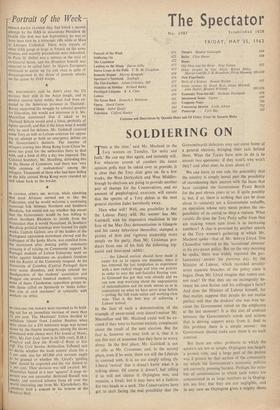—Portrait of the Week
FRENCH POLICE CLAIMED they had foiled a second attempt by the OAS to assassinate President de Gaulle (the first was last September); he was to have been shot by a telescopic rifle while at Mass in Limoges Cathedral. There were reports of other OAS gangs at large in France on the same mission, and security precautions were redoubled. In Paris M. Debre was a witness at the trial of ex-General Satan, and the President himself was expected to be called later. In Algiers Europeans continued to queue up for exit visas in spite of discouragement in the shape of grenade attacks on the queue by OAS troops.
KHRUSHCHEV said he didn't envy the US marines their stint in the Asian jungle, and in general reacted more mildly than had been ex- pected to the American presence in Thailand : Russia supported.the struggle by colonial peoples for liberation, but would not intervene in it. Mr. Macmillan announced that if asked to by Thailand Britain would send a force, probably of tighter aircraft, and that if the force went it would only be used for defence. Mr. Gaitskell received some Tory as well as Labour criticism for oppos- ing an attempt to hold an emergency debate on the Government's decision. The number of refugees coming into Hong Kong from China be- came too great for the authorities there to deal with, and a limit of fifty a day was imposed. The Colonial Secretary, Mr. Maudling, defending this in the House of Commons, said there was 'very little evidence of malnutrition' among the refugees. Thousands of them who had been hiding in the hills around Hong Kong were rounded up and taken back to the border.
*
IN CENTRAL AFRICA MR. BUTLER, while admitting that most Africans seemed not to like the federation, said he would welcome a continuing economic link between Northern and Southern Rhodesia, but would not say whether this meant that the Government would be less willing to allow Northern Rhodesia to secede from the Federation than it would Nyasaland. In Southern Rhodesia politiCal meetings were banned for eight weeks. Captain Galvao, one of the leaders of the Portuguese opposition movement abroad and the kidnapper of the Santa Maria, was expelled from the movement after making public statements accusing it of relying on Communist support. In Portugal students of Lisbon University went on strike against limitations on academic freedom and the Rector of the University resigned. At the University of Coimbra (Central. Portugal) there were worse disorders, and troops entered the headquarters of the students' association and dragged out several hundred students, arresting some of them. Clandestine opposition groups in- side Spain called on Spaniards to 'make collec- tive acts of civil resistance' in sympathy with Workers on strike.
IN ENGLAND THE NURSES were reported to be hold- ing out for an immediate increase of more than 2i per cent. The Musicians' Union decided to withdraw labour from London theatres when their claim for a £19 minimum wage was turned down by the theatre managers; among the shows threatened with silence were The Sound of Music, Blitz, My Fair Lady (now in its fifth year), H.M.S. Pinafore and Stop the World—I Want to Get g. The Civil Service Arbitraiion Tribunal met to decide whether the trade unions' claim for a 5 per cent, rise for 485,000 civil servants ought to be granted or whether Mr. Lloyd's 'guiding light. should be respected and the rise limited to 2 per cent. Their decision was still awaited. Mr. Macmillan hinted at a new 'squeeze' if wage re- straint was not successful. Bertrand Russell was ninety, and received tributes from all over the world (including one from Mr. Khrushchev). His admirers held a concert in his honour at the Festival Hall.






































 Previous page
Previous page